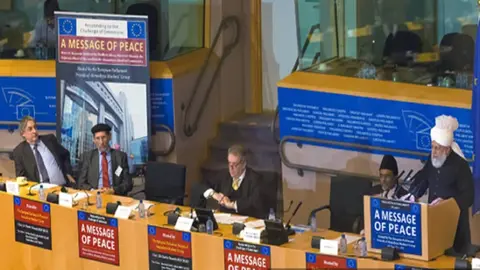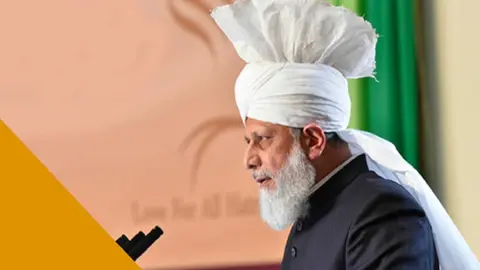A path to peace: just relations between nations (I)

On June 27, 2012, a historic event took place on Capitol Hill in Washington, D.C. when His Holiness Hazrat Mirza Masrur Ahmad, the Fifth Khalifa, Successor of the Promised Messiah (lpD) and Leader of the Ahmadiyya Muslim Community, addressed prominent members of Congress: senators, ambassadors, White House and State Department staff, NGO leaders, religious leaders, professors, political advisors, bureaucrats, members of the Diplomatic Corps, representatives of think tanks and the Pentagon, and journalists from the media.
The meeting, the first of its kind, provided an opportunity for some of America's most influential leaders, including the Honourable Nancy Pelosi, Democratic leader of the House of Representatives, to hear first-hand Islam's message on world peace. Following the event, His Holiness was given a tour of the Capitol building, before being escorted to the House of Representatives, where a Resolution was introduced in honour of his visit to the United States.
Text of the speech
Bismil'lahir-Rahmanir-Rahim-In the name of Allah, the Gracious, the Merciful.
To all the distinguished guests-Assalamu 'alaikum wa rahmatul'lahi wa barakatuhu-may the peace and blessings of God be upon you all.
I would like first of all to take this opportunity to thank you for sacrificing your time to come and listen to what I have to say. I have been asked to speak on a subject that is vast, wide-ranging and encompasses so many aspects that it is not possible to deal with it in its entirety in the limited time that I have at my disposal. The subject I have been asked to comment on concerns the establishment of world peace, which is undoubtedly the most crucial and urgent issue the world needs today. Due to time constraints, I will present only the Islamic point of view on peacemaking through just and equitable relations between nations.
The truth is that peace and justice are inseparable; one cannot be achieved without the other. This is a principle understood by every sensible and intelligent person and, excluding those who are determined to create disorder in the world, there is no one who can claim that there is any society, country, or even the whole world, where, while justice and fair dealing reign, disorder or lack of peace takes place.
Yet we see that in many parts of the world there is indeed disorder and a lack of peace. This disorder is both internal, i.e. taking place within countries, and external, in terms of relations between different nations, and it takes place despite the fact that all governments claim that their policies are based on justice, and that peacemaking is their priority objective. However, there is little doubt that unrest and anxiety in the world is only increasing, and that disorder is only spreading. This situation clearly indicates that, somewhere in the process, the demands of justice are not being met. Hence, there is an urgent need to end inequality, wherever and whenever it exists. For this reason, as the world leader of the Ahmadiyya Muslim Community, I would like to make some observations on the need and the way to achieve peace based on justice.
The Ahmadiyya Muslim Community is a purely religious community, and we hold the firm conviction that the Messiah and Reformer destined to appear in this age to illustrate to the world the splendour of the true teachings of Islam has already come. We believe that the Founder of our Community, Hazrat Mirza Ghulam Ahmad of Qadian (lpD) is the Promised Messiah and Reformer and, therefore, we have accepted him. He instructed his followers to spread the true teachings of Islam based on the Holy Quran. Therefore, whatever I say in relation to peacemaking and the promotion of just international relations will be based on the teachings of the Holy Quran.
All of you regularly express your opinions and indeed make great efforts to establish world peace. Your creative and insightful minds enable you to come up with great ideas, plans and even new visions of how to consolidate peace. That is why it does not concern me to talk about this issue from a worldly or political perspective; the focus of my attention will be on how to establish peace on the basis of religion. For this purpose I must, as I have already said, present some very important guidelines gleaned from the teachings of the Holy Quran.
It is important to remember that human knowledge and intellect are not perfect, but limited, and when making decisions or forging thoughts, there are often factors that interfere with the human mind, cloud judgement and lead people to try to achieve what they consider to be their own rights. Ultimately, this can culminate in unjust outcomes and decisions. In contrast, God's Law is perfect, with no self-interest or disloyal dispositions, because God desires only the good and betterment of His Creation and therefore His Law is based wholly on justice. The day when people recognise and understand this essential point will be the day when the foundation of peace is established. Otherwise, efforts to establish peace, however relentless, will continue to yield no results.
After the end of World War I, the leaders of some countries wished that in the future all nations would maintain good and peaceful relations and, in the effort to seek world peace, the League of Nations was created, whose main objective was to maintain peace and prevent new wars. Unfortunately, the rules of the League of Nations and its resolutions contained flaws and shortcomings that prevented equal protection of the rights of all people and nations. As a consequence of these inequalities, lasting peace could not prevail, the League's efforts failed, and culminated directly in World War II.
We are all aware of the unparalleled destruction and devastation that accompanied it. Some 75 million people, mostly civilians, lost their lives overall. That war should have been enough to open the eyes of the world, it should have been the trigger for the development of sensible policies that would grant everyone their legitimate rights, based on justice, and capable of creating a way to establish peace in the world. The rulers of the world at that time, with the same desire to establish peace, founded the United Nations. However, it soon became clear that the noble and overarching goal that underpinned the United Nations could not be fulfilled either. So much so that today there are governments openly declaring its failure.
What does Islam have to say about international relations based on justice and thus as a means to establish peace? In The Holy Quran, God Almighty clearly explains that our nationalities and ethnic origins, while acting as a means of identity, do not endorse or validate any kind of superiority.
Thus, The Holy Quran makes it clear that all people are born equal. The Holy Prophet Muhammad (lpbD) in his last sermon, instructed all Muslims to always remember that an Arab is not superior to a non-Arab, nor is a non-Arab superior to an Arab. He taught that a white is not superior to a black, nor is a black superior to a white. Thus, equality among all nations and races is a basic and clear teaching of Islam, as is equality of rights, without discrimination or prejudice. This is a golden principle that enables the establishment of the foundations of harmony between different nations as well as the establishment of peace.
(lpbD) - may God's peace and blessings be upon him.
(lpd) - peace be upon him.
(We will continue this discourse in the next installment: "A Key to Peace: Global Unity (II)").



